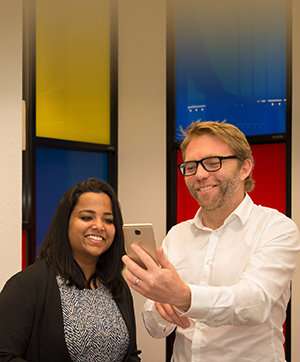Smart app for diabetes

The use of smartphones and other mobile devices to deliver healthcare and preventative health services is increasing and is seen as a particularly important healthcare tool in low and middle-income countries.
The benefits of using mobile health – or mHealth – in diabetes prevention is being investigated by Deakin University PhD student Shruti Muralidharan, who is examining whether a 12-week educational program delivered through a smart phone app changes the behaviour of study subjects in India at high risk of developing the disease.
Ms Muralidharan, from Chennai in South India, is undertaking a joint PhD with Deakin and Chennai's Madras Diabetes Research Foundation (MDRF). She is currently completing data analysis for her thesis at Deakin's Waterfront campus as part of Deakin's unique In Country PhD program, which allows PhD candidates to study and work in their own country while receiving joint supervision from Deakin and their home institute. As part of the program, students spend six months in Australia at Deakin.
Deakin and MDRF have a longstanding research collaboration in diabetes prevention and education, with MDRF's President and Director of MDRF Dr Viswanathan Mohan recently awarded an Honorary Doctorate from Deakin for his work in the field.
Ms Muralidharan, who is supervised by Dr Mohan and Professor Steven Allender from Deakin's Centre for Population Health Research, said her research was exploring how using an Android app to deliver lessons in diabetes prevention changed users' weight status, dietary habits and levels of physical activity.
She is particularly focusing on whether using the app results in weight loss and a reduction in cardio-metabolic risk factors such as lipids, blood pressure, insulin and blood glucose, and behavioural and social variables such as physical activity, diet and quality of life.
"Diabetes is a major health issue in India, with more than 69 million people diagnosed with the disease," Ms Muralidharan said.
Ms Muralidharan said the research team chose to target Android smart phone users as they make up around 97 per cent of smart phone users in India.
While the main component of the app is 12 weeks of video lessons addressing real-life challenges – such as eating out and peer pressure to try unhealthy foods – it also offers text messages, interactive screens and trivia quizzes. Participants also receive weekly calls from a health coach.
Ms Muralidharan said the video lessons were based on experiences derived from a previous MDRF-led study, the Diabetes Community Lifestyle Improvement program (D-CLIP), which used a culturally-modified US Diabetes Prevention Program to deliver the lessons in a face-to-face environment.
"The video lessons show the study population how to deal with real-life situations around their behaviour. For example, if you want to lose weight, and friends are urging you to try a particular high-calorie food at a party, what strategies would you use to deal with that situation?" Ms Muralidharan explained.
Another important part of the program is tracking how participants' behaviour changes in response to what they learn.
"Now that you have learnt what you have to do, how do you apply it? How do we, as researchers, know if you have done it or not?" Ms Muralidharan asked.
"Because this is a mHealth trial, we can't just use the methods we use in a face-to-face trial, so we have trackers on the app, including a physical activity tracker, a diet tracker and a weight tracker. The diet tracker is specifically tailored to Indian diets, but contains some continental items."
Ms Muralidharan said one of the potential issues with the use of a physical activity tracker in smartphones was Indian clothing, as saris don't have pockets for women to carry their phones in.
"We've really had to think how the physical activity tracker will work in this case," she said. "It will be interesting to analyse just how well the participants' learning has influenced their activity levels."
Ms Muralidharan said she has had always been interested in diabetes research and discovering Deakin's In Country PhD program had encouraged her to take on her PhD.
"When you live in India and you are working on an intervention for an Indian population it makes sense to be able to stay in India to study, but also be able to spend that time in Australia learning a new culture and different ways of doing things."
Ms Muralidharan said Deakin's Professor Allender, and Associate Professor of Biostatistics with the Faculty of Health Liliana Orellana, had provided great support in analysing her data and keeping her on PhD on track. She has also had the opportunity to present her research to the Australian Centre for Behavioural Research in Diabetes while in Australia.
Professor Allender said research initiatives such as the In Country PhD program were invaluable in enabling Deakin to build partnerships with some of the world's leading researchers.
"Dr Mohan and MDRF are world leaders in the prevention and treatment of diabetes and the chance to collaborate with Shruti on this project is beneficial to Deakin and the broader agenda of preventive health," he said.
Ms Muralidharan hopes to complete the first draft of her thesis early next year and submit the final work by April.




















